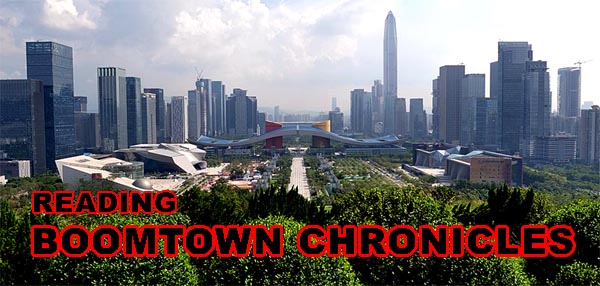 |
| Shenzhen, the Boomtown (Wikipedia) |
Note: Between Lesson #01-128 and #01-208, I wrote 72 lessons explaining expressions in articles published in the Shenzhen Daily. Read more about "Reading Boomtown Chronicles."
Get Ready: What transactions are you comfortable with doing at an ATM, and what would you rather do (or do you have to do) with a human teller?
Boomtown Chronicles Part XXIV - published Monday, December 22, 2008
- "investment channels"
channel: a route through which something is transmitted. A "channel" can be many things: a television channel; a waterway, like a river or stream; a groove cut into something, like the decorations on a piece of furniture; or, as here, a method of transmitting investments.
- obtaining a "mortgage"
mortgage: a special kind of contract for a large purchase such as a house, to be paid off over time. (It can also be a verb.) This loan is secured by something of value (called "collateral") that can be given to the creditor if the payments aren't made.
The origin of the word is extremely interesting. The mort- syllable means "dead," as in "mortal" and "mortuary"; -gage is a pledge or promise, as when a couple becomes "engaged." So what is a "dead promise"? Scholars disagree, but one explanation is this: If you miss your payments, the collateral you offered as a guarantee of payments is taken away, and becomes "dead" to you.
- "automatic teller machines" ("ATMs")
teller: a person or machine that counts something. Banks often have human "tellers." Though we usually think of "tell" as meaning "say," in fact it also means "count." So bank tellers (human or automatic) are responsible for counting money.
- a banking "outlet"
outlet: a branch or sub-branch. In Chinese banking, it seems, there are branches that offer full service, and sub-branches whose services are somewhat limited. The word "outlet" conveniently covers both types of locations. Interestingly, it originally meant "river mouth," and "branch," too, can refer to part of a river that splits off from the main body of water.
- "Rural credit cooperatives" and "urban cooperatives" preceded the founding of some of Shenzhen's banks.
cooperative: a group that has banded together for mutual support and benefit, sometimes called a "co-op." Credit unions in the U.S. are one form of cooperative. "Rural" and "urban," of course, refer to the countryside and the city.
--------Read more: https://en.wikipedia.org/wiki/Shenzhen
Practice: Choose the correct term to fill in the blank in the sentence below:
- ATM
- channels
- cooperative
- mortgage
- outlet
- rural
- teller
- urban
- When his tractor broke, Zeke took out a low-interest loan from the farmers' ________ to replace it.
- It can be difficult to find natural spots when you live in an ________ environment.
- Marvin always bought his phones at a local ________ so he could exchange them if there was a problem.
- If you want action from the government, you'll have to go through the proper ________.
- After he lost his job, Ned took out a second ________ on his house to help cover his monthly expenses.
- Some banks charge a fee if you need to transact business with a human ________.
- Life is more relaxing in ________ communities.
- On her way to the restaurant, Louise stopped at the ________ to get some cash.
Answers are in the first comment below.
Submitted to the Shenzhen Daily for December 29, 2008


Answers to the Practice: 1. h; 2. d; 3. a; 4. e; 5. c; 6. g; 7. f; 8. b
ReplyDelete